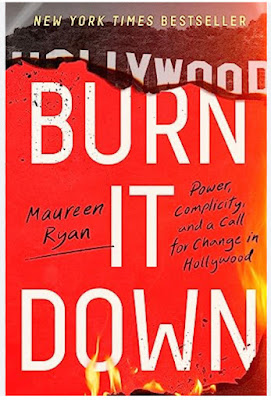Burn It Down: Power, Complicity, and a Call for Change in Hollywood
By Maureen Ryan
Mariner Books; hardcover, 384 pages; $29.99
Maureen Ryan is a contributing editor at Vanity Fair and has covered the entertainment industry as a critic and reporter for three decades. Previously, she served as the chief television critic for Variety and the Huffington Post, and her work has appeared in Entertainment Weekly, the New York Times, Salon, GQ Vulture, the Chicago Tribune, and more. She has served on the jury of the Peabody Awards and has won three Los Angeles Press Club Awards.
In Burn It Down, Ryan examines the corrosive culture of Hollywood, and how it is never just One Bad Man. She draws on decades of experience to connect the dots and illuminate the deeper forces that sustain this. To break the cycle of abuse and exploitation of workers that is baked into the foundations of the entertainment industry, and make change that sticks, it's important to not see headline-making stories as isolated events.
Ryan's original reporting sheds light on problematic situations at companies and shows such as Saturday Night Live, Sleepy Hollow, and The Goldbergs. Actors and famous creatives such as Evan Rachel Wood, Harold Perrineau, Damon Lindelof, Orlando Jones, and others discuss industry "norms" that aren't normal. Hollywood should be viewed through a lens of the bigger picture, in order to see how abusers are created, fed, rewarded, allowed to persist.
Myths about Hollywood as a meritocracy, what it takes to be creative, and the value of human dignity, are dismantled by Ryan one by one. These have been myths that the entertainment industry has used to promote itself, and have allowed abusers to thrive and the industry to avoid accountability.
Hollywood misbehavior is often followed by promises to change and "do the work." Ryan's mix of reporting, interviews, and commentary deepens and pushes forward the conversation about power and Hollywood.
Ryan offers a blueprint for what labor and other coalitions can to create real change, with experts on repentance, restorative justice, and clinical narcissism offering a comprehensive idea of what that should look like. This has been endorsed by Linda Holmes, Rebecca Traister, W. Kamau Bell, Emily Nussbaum, and many others.
This book will only deepen your understanding of the writers' and actors' strikes going on in Hollywood right now, which have essentially shut down movie and television production.
In this excerpt, Ryan writes of how she approaches reporting on this era of change in Hollywood: "Wherever you land on the status of industry reform, know this: it is not in any Hollywood employee's interest to tell the world about the difficulties, unprofessional conduct, biases, toxicity, or abuses they've endured. There's often no upside in it, and tons of potential downsides. Unless a creative person feels they can risk rejection from an industry that is already brutal on its best day, what is the motivation to expose awful workplaces or powerful people by name? For a hundred years, the Hollywood machinery has been programmed to minimize, if not outright crush, people who step out of line or bring unwanted attention to individual, institutional, or systemic problems.
For years, I've done a lot of what I call 'journalism triage' - talking to folks confidentially to help them decide if they want to work with members of the press. In these conversations, I explain how responsible journalism works and what a reporter needs if someone wants to tell their story in a public forum. Many times, the people I talk to decide they are not quite ready to go public. I get it, truly. I'm fully aware that telling an excruciating story even off the record can be terrifying. And as an assault survivor myself, I understand the need to slow down, process, and figure out what the least-bad survival strategies might be. I say without judgment that in the wake of many, many off-the-record conversations over the years, a sizable chunk of the worst stuff I know about the industry remains inside my brain, unpublished. (Yes, I am in therapy.)
That said, things are shifting, to a degree. The courage of those who find themselves about to speak out publicly has awed me, many times. Hollywood executives and powerbrokers are being pushed by whistleblowers, social media, the court of public opinion, and journalists like me to deal with accusations of harm, exploitation, and abuse in ways they've never had to before.
But the process is not without migraine-inducing setbacks. I recall a conversation I had a few years ago, in my role as a reporter and the chief television critic for the Hollywood trade publication Variety. As had become my unsettling new normal, I was investigating a story about abuse of power in the realm of television. Again.
The conversation I'm thinking of was with a PR person for a large entertainment conglomerate. It is memorable because it helped illuminate why the industry has been so resistant to change. I'd dealt with this person before, when I was slogging my way through a series of stories about nightmare bosses at that company. After this individual confirmed some information, we talked more broadly about the issues facing Hollywood. My phone and inbox were still jam-packed with tales of misery from those who feared their chance to be honest about their experiences was about to evaporate because the industry would do what it always does: wait for the storm to blow over and carry on as usual. More than a year after #MeToo broke wide open, it felt like things were getting worse, not better. The Hollywood ending I'd been trained to expect - the catharsis and change I'd been programmed to think were possible - that was nowhere in sight."

No comments:
Post a Comment